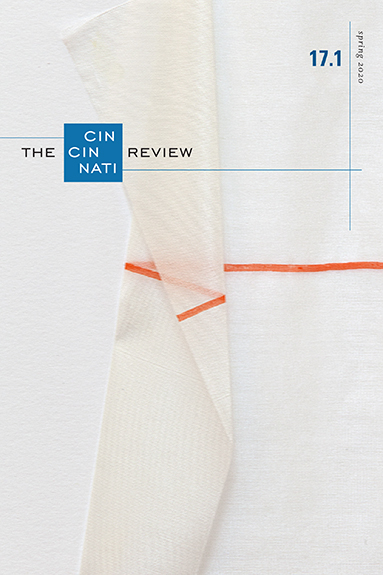I’d heard plenty about how a mother’s devotion to her kids is primal. I got it—I could imagine that sort of wild, beyond-the-brain love, the kind of protectiveness that can sprout claws and incisors. I expected having a child to change my priorities, my routines, my capacity for tenderness and rage.
I didn’t expect it to change my soundscape.
But my son’s cries were lava. They were lightning. They were a hot razor raked through my insides. My milk would start flowing—my body’s way of saying, before my brain could get there, Here, let me fix it.
In his book Silence: In the Age of Noise, explorer Erling Kagge says silence can be found within, even in the noisiest of circumstances. It is, he writes, “more of an idea. A notion.”
Either this is bullshit, or I’m doing it wrong.
Summer 2018: the news about the Honduran woman whose infant was taken from her while breastfeeding. This story was the flashing red light at the top of a mounting skyscraper of inconceivable reports: Children separated from their parents at the border. Children kept in cages at “facilities.” Parents told that their children were going to bathe, guards saying they were “following orders”—unmistakable echoes of another horror.
Homeland Security officials denied they’d removed any breastfeeding infants.
Natalia Cornelio, criminal justice director for the Texas Civil Rights Project, said, “I know what I heard from this lady. She told it to me in tears.”
I thought for a long time about what this mother might have heard as her child was carried away. About what those sounds did to her body.
Sometimes my son would cry when he wasn’t hungry or wet or tired. He would cry just because he was a new human—and he was mysterious. The wailing would go on and on, rattling through me as I tried everything I could to fix it.
But sometimes I couldn’t fix it. And sometimes when I couldn’t, I’d hand our son over to my husband and shut myself in our bathroom, turn on the fan, stand there under its loud hum. The relief was immediate: as soon as I blocked out the crying, my breathing returned to normal, my lava-blood cooled. I’d stand there inside the blessed white noise for a few minutes, then return to where my husband was doing his own unsuccessful best. Our son would still be wailing. “Okay,” I’d say and reach for him again.
In grad school my friend and her partner had a baby. We were all young, and parties were weekly, but I marveled when my friend told a handful of us to come over on Saturday and bring some wine. Their child was maybe two months old. I’d always imagined one’s life pausing once a baby was born, rotating in place, suspended, like some sort of orb in a ’70s sci-fi movie, and then returning to earth completely transformed. What did I know? I was years from having kids myself.
When I showed up, the gathering was in full swing. Not a party, exactly, but a small group of twenty- and thirtysomethings hanging out, drinking, laughing. It wasn’t quiet. “Where’s the baby?” I asked my friend, wondering if maybe a grandparent had him for the weekend.
“He’s asleep in there,” she replied, nodding toward a slightly ajar bedroom door a yard from where we were standing.
I was aghast. “Aren’t you worried we’re going to wake him up?”
“Nah,” she said, “we want him to get used to noise. Otherwise we’ll have to be quiet all the time.” She laughed and turned to greet another guest. What a genius strategy, I thought.
For the first two days of our oldest son’s life, he slept almost constantly—a peaceful, cozying-in slumber. This is bliss, I thought, gazing at his impossibly perfect ears. Then he stopped sleeping altogether. Or, more accurately, he stopped sleeping for any substantial stretch. Twenty minutes at a time for a nap, maybe an hour and fifteen minutes at night. We tried the rocking, the swaddle, the shushing, the ocean noise, the swinging. None of it worked. He would fall asleep only after nursing and would wake the second I laid him down. My husband said, not really joking, that someone could make millions inventing a long-handled tray to slide infants into bed without disturbing them. I developed a technique—I’d lay my son down and keep my hands on him. I’d count to five and remove one finger. Count to five again and remove another. I’d do this until I’d slowly detached myself from him. Sometimes it worked. Other times his gray-blue eyes would pop open, and again I’d rock him, shush him, swing him, sing to him, reswaddle, reswaddle, reswaddle.
For months I was bleary with lack of sleep. My days were fogged. I felt vaguely disassembled, as if each of my atoms had a teeny bit of extra space around it. It was like being slightly drunk all the time, which isn’t a feeling you want unless you’ve been drinking. So whenever our son did nod off during the night, I dove for sleep myself like a hawk for a rabbit. I was ravenous, single-minded, unabashedly greedy. I was absolutely desperate not to wake my son, desperate for the quiet that might let his sleep continue.
I became silence-obsessed; I’d do anything to create and preserve it. If I wanted a snack before bed, I’d find something that didn’t require unwrapping or utensil clinking. If I got up in the night to pee, I wouldn’t flush the toilet. If I had to sneeze while in bed, I’d bury my face in my pillow, swallow the sneeze so that my throat stung. A car horn outside, an incoming text, a cat fight across the street made my heart spasm in an illogical concord of panic and rage—Shut up, I thought fervently, shut up. Our bed creaked, so I’d find one position for sleep and hold myself to it all night.
According to the Department of Homeland Security, in the six weeks between April 19 and May 31, 2018, nearly two thousand minors were separated from adults at the US/Mexico border. When questioned about the cruelty of this policy, the attorney general said, “I would cite you to the Apostle Paul and his clear and wise command in Romans 13, to obey the laws of the government because God has ordained them for the purpose of order.” I read this quote online. I couldn’t bear to watch the clip because I didn’t want to hear his voice.
. . .
For more of this essay or other great literary nonfiction in issue 17.1, order now in our online store. Digital copies are only $5!











